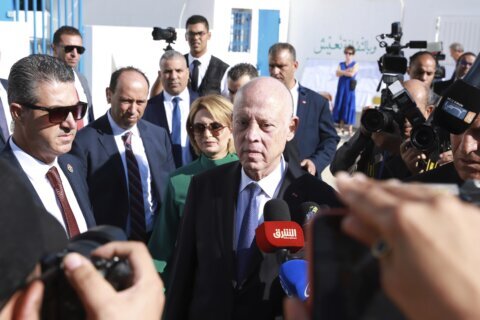BEIRUT (AP) — U.S. Secretary of State Antony Blinken said Wednesday that mediators would keep trying to close an elusive cease-fire deal for Gaza after Hamas proposed changes to a U.S.-backed plan, some of which he said were “workable” and some not.
The back-and-forth laid bare frustration over the difficulty of reaching an accord that could end eight months of war that has decimated the territory, killed tens of thousands of Palestinians and left scores of Israeli hostages still languishing in militant captivity. Previous moments of optimism have been repeatedly dashed by the differences between the two sides.
The cease-fire proposal has global support but has not been fully embraced by Israel or Hamas. Blinken did not spell out what changes Hamas sought, but he said the mediators — Qatar, Egypt and the U.S. — will keep trying to “close this deal.” He put the onus on Hamas, accusing it of changing its demands.
“Hamas has proposed numerous changes to the proposal that was on the table. … Some of the changes are workable. Some are not,” Blinken told reporters in Qatar. “I believe that they (the differences) are bridgeable, but that doesn’t mean they will be bridged because ultimately Hamas has to decide.”
Blinken’s comments came as Lebanon’s Hezbollah fired a massive barrage of rockets into northern Israel to avenge the killing of a top commander, further escalating regional tensions.
Hezbollah, an Iran-backed ally of Hamas, has traded fire with Israel nearly every day since the Israel-Hamas war began and says it will stop only if there is a truce in Gaza. That has raised fears of an even more devastating regional conflagration.
Air-raid sirens sounded across northern Israel, and the military said about 215 projectiles were fired from southern Lebanon, making it one of the largest attacks since the fighting began. There were no immediate reports of casualties as some rockets were intercepted while others ignited brush fires.
Hamas asks for changes
Hamas conveyed its official reply to the proposal to mediators on Tuesday. Hamas spokesman Jihad Taha told the Lebanese news outlet ElNashra that the “amendments” requested by the group aim to guarantee a permanent cease-fire and complete Israeli troop withdrawal from Gaza.
The proposal announced by U.S. President Joe Biden includes those provisions, but Hamas has expressed wariness about whether Israel will implement the terms. While the U.S. says Israel has accepted the proposal, Israeli Prime Minister Benjamin Netanyahu has given conflicting statements, saying Israel is still intent on its goal of destroying Hamas.
Blinken, on his eighth visit to the region since the start of the war, said the deal on the table was “virtually identical” to one Hamas put forth on May 6. The U.N. Security Council voted overwhelmingly in favor of the plan on Monday.
“At some point in a negotiation, and this has gone back and forth for a long time, you get to a point where if one side continues to change its demands, including making demands and insisting on changes for things that it already accepted, you have to question whether they’re proceeding in good faith or not,” he said.
Speaking alongside Blinken, Qatari Deputy Prime Minister and Foreign Minister Sheikh Mohammed bin Abdulrahman bin Jassim Al Thani said there had been “counterproductive” actions by both sides.
The proposal’s three-phase plan would begin with a six-week cease-fire and the release of some hostages in exchange for Palestinian prisoners. Israeli forces would withdraw from populated areas, and Palestinian civilians would be allowed to return to their homes. Aid distribution would also increase.
At the same time, negotiations would start over the second phase, which is to bring “a permanent end to hostilities” and “full withdrawal” of Israeli troops from Gaza in exchange for the release of all remaining hostages.
Phase three would see the launch of a reconstruction plan for Gaza and the return of remains of deceased hostages.
A major hitch for both sides appears to be the negotiations for the second phase.
Israel’s ambassador to the U.N., Gilad Erdan, said Israel will demand that Hamas be removed from power as part of any agreement on that phase.
“One of our conditions is not only the release of the hostages, it’s also the future of Gaza,” Erdan told CNN’s “The Source” on Monday. “We cannot agree to Hamas continuing to be the rulers of Gaza because then Gaza will continue to pose a threat to Israel.”
He also said Israel opposes a provision extending the initial cease-fire as long as talks are going on, saying it would allow Hamas to “continue with endless and meaningless negotiations.”
Hamas, in turn, appears to want stronger guarantees up front that the talks will lead to the permanent cease-fire and withdrawal.
Netanyahu’s far-right coalition allies have rejected the proposal and threaten to bring down his government if he ends the war leaving Hamas intact. But Netanyahu is also under mounting pressure to accept a deal to bring the hostages back. Thousands of Israelis, including families of the hostages, have demonstrated in favor of the U.S.-backed plan.
Israel’s bombardment and ground offensives in Gaza have killed over 37,000 Palestinians, according to Palestinian health officials, who do not give the breakdown of civilians and fighters. The war has also driven some 80% of the population of 2.3 million from their homes, and Israeli restrictions and ongoing fighting have hindered efforts to bring in humanitarian aid, fueling widespread hunger.
Israel launched its campaign after Hamas and other militants stormed into Israel on Oct. 7, killing some 1,200 people, mostly civilians, and taking around 250 hostage. Over 100 hostages were released during a weeklong cease-fire last year in exchange for Palestinians imprisoned by Israel. Hamas is believed to be holding around 80 hostages and the remains of another 40.
Revenge for slain commander
Netanyahu’s office said he was conducting a security assessment in light of Hezbollah’s barrage in the north and what it called Hamas’ “negative response” to the proposal.
Hezbollah said it fired missiles and rockets at two military bases in retaliation for the killing of Taleb Sami Abdullah, 55. Known within Hezbollah as Hajj Abu Taleb, he is the most senior commander killed since the fighting began eight months ago. The Israeli strike late Tuesday destroyed a house where Abdullah and three other officials were meeting, about 10 kilometers (6 miles) from the border.
A Hezbollah official told The Associated Press that Abdullah was in charge of a large part of the Lebanon-Israel front, including the area facing the Israeli town of Kiryat Shmona, which Hezbollah has repeatedly attacked in recent days, causing fires in the area.
The official, who was not authorized to speak to media and spoke on condition of anonymity, said Abdullah had joined Hezbollah decades ago and took part in attacks against Israeli forces during their 18-year occupation of southern Lebanon that ended in May 2000.
Israeli airstrikes on Lebanon have killed over 400 people, most of them Hezbollah members, but the dead also include more than 70 civilians and noncombatants. On the Israeli side, 15 soldiers and 10 civilians have been killed since the war in Gaza began.
Other groups allied with Iran, including powerful militias in Iraq and Syria, and the Houthi rebels in Yemen, have also attacked Israeli, U.S. and other targets since the start of the war, often drawing Western retaliation. In April, Israel and Iran traded fire directly for the first time.
___
Jeffery reported from Jerusalem. AP correspondent Kareem Chehayeb in Beirut contributed to this report.
___
Follow AP’s coverage of the war in Gaza at https://apnews.com/hub/israel-hamas-war
Copyright © 2024 The Associated Press. All rights reserved. This material may not be published, broadcast, written or redistributed.







